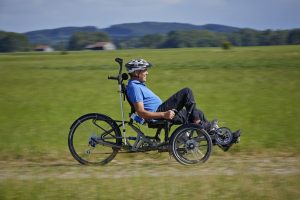
Cycling into old age
My grandfather was 75 years old when he took me on his bike for the first time. My seat was a small saddle on the horizontal frame bar and small fold-out footrests on the unsprung fork for my feet.
At the time, I could only ride myself on a classic scooter, but it can't have been too long before I gained complete freedom on my own bike. Nobody had to teach us children that back then, we just kept trying until it worked, that's how exciting our own mobility was long before there were "parent taxis"...
My grandfather, meanwhile, rode his classic men's bike without gears, which he probably bought in the early 1950s, until he was 93. He let himself roll downhill, pushed on the inclines and rode illegally through the pedestrian zone, where all the police turned a blind eye. Shortly before his death, he cycled to Lemgo, four kilometres away. There, in the department stores', he fell on the escalator and was taken to hospital, where he died a week later. The bike had kept him fit and mobile until then...
Cycling in old age more attractive than ever
Today it is more attractive than ever to cycle in old age. A huge variety of light and smooth-running bikes at favourable prices can be found on the market today, unlike the heavy "wire bikes" without gears that characterised everyday cycling for over 70 years. If you are prepared to pay a little more, you can get electric assistance or a third wheel while pedalling and can still glide through the fresh air lying down.
The electric assistance of the "pedelec" (colloquially incorrectly called "eBike") makes cycling even healthier, especially in old age. It is easy on the joints when cycling uphill and stimulates the circulation without being strenuous. Everyone can observe the psychological effects on themselves: As soon as you get on your bike, your mood lifts. There are even studies that suggest that cycling on a pedelec is healthier in old age than cycling without electric assistance.
Trikes help you stay mobile
But it's not just joint problems that can make (longer) cycling unpleasant in old age if you don't have the right bike. Balance problems, dizziness and other age-related impairments can also make cycling uncomfortable or even impossible. This is where trikes come into play. With three wheels, recumbent, with or without electricity, new perspectives of truly autonomous mobility are opening up for many people who thought they would have to give up cycling.
Anyone who believes that trikes are just a simple further development of tricycles is mistaken. Trikes are produced in every conceivable variation and one extreme sportswoman has even cycled to the South Pole on a so-called "fat trike". The bikes are therefore robust, suitable for off-road use if required, lightweight, suitable for everyday use and age-appropriate. There have never been fewer external reasons not to cycle in old age, especially as today even 105-year-olds are setting world records on bikes.
Life is good - on a bike. Even in old age! The 105-year-old world record holder allegedly only started cycling "seriously" at the age of 78...
